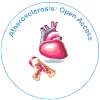Nuestro grupo organiza más de 3000 Series de conferencias Eventos cada año en EE. UU., Europa y América. Asia con el apoyo de 1.000 sociedades científicas más y publica más de 700 Acceso abierto Revistas que contienen más de 50.000 personalidades eminentes, científicos de renombre como miembros del consejo editorial.
Revistas de acceso abierto que ganan más lectores y citas
700 revistas y 15 000 000 de lectores Cada revista obtiene más de 25 000 lectores
Indexado en
- Google Académico
- Búsqueda de referencia
- Universidad Hamdard
- EBSCO AZ
- publones
- ICMJE
Enlaces útiles
Revistas de acceso abierto
Comparte esta página
Abstracto
Reparación de heridas y activación del endotelio mediada por MCP-1
Kim Weber, Peter Nelson, Hermann-Joseph Grone y Christian Weber
La reacción en cadena de la polimerasa con transcripción inversa, la protección de la ARNasa, el Western blot y el análisis de citometría de flujo mostraron que las células endoteliales de la vena umbilical humana expresan ARNm y proteína de superficie del receptor CCR2 de la proteína quimiotáctica de monocitos-1 (MCP-1), que fue regulado positivamente por citocinas inflamatorias. MCP-1 indujo la migración de células endoteliales en un ensayo transwell, que fue inhibida por los antagonistas del receptor MCP-1 9-76. El aumento de la secreción de MCP-1 o interleucina-8, pero no de RANTES, en la lesión endotelial sugirió un papel funcional de CCR2 en la reparación de heridas según lo medido por ELISA. Después de la lesión mecánica a las monocapas endoteliales, que se cerraron espontáneamente en 24 horas, la reparación de la herida se retrasó por los antagonistas 9-76 y por un anticuerpo monoclonal bloqueante para MCP-1, pero no para interleucina-8, y fue mejorada por MCP-1 exógeno. Esto se confirmó mediante la cuantificación de la migración celular en el área de la herida, mientras que la proliferación y la viabilidad no se vieron alteradas por MCP-1 o su análogo. Cabe destacar que la inmunohistoquímica del tejido inflamado reveló tinción de CCR2 en el endotelio arterial, venoso y venular afectado por la infiltración celular. Esta es la primera demostración de la expresión de CCR2 endotelial ex vivo, lo que infiere su participación en condiciones inflamatorias. Por lo tanto, las células endoteliales expresan CCR2 funcional que puede tener implicaciones importantes para la reparación de heridas endoteliales y las reacciones inflamatorias.
Revistas por tema
- Agricultura y acuicultura
- Alimentación y Nutrición
- Bioinformática y biología de sistemas
- Bioquímica
- Ciencia de los Materiales
- Ciencia general
- Ciencias Ambientales
- Ciencias Clínicas
- Ciencias farmacéuticas
- Ciencias Médicas
- Ciencias Sociales y Políticas
- Ciencias Veterinarias
- Enfermería y atención sanitaria
- Física
- Genética y biología molecular
- Geología y Ciencias de la Tierra
- Ingeniería
- Inmunología y Microbiología
- Química
Revistas clínicas y médicas
- Anestesiología
- Biología Molecular
- Cardiología
- Cirugía
- Cuidado de la salud
- Dermatología
- Diabetes y Endocrinología
- Enfermedades infecciosas
- Enfermería
- Gastroenterología
- Genética
- Inmunología
- Investigación clínica
- Medicamento
- Microbiología
- Neurología
- Odontología
- Oftalmología
- Oncología
- Pediatría
- Toxicología

 English
English  Chinese
Chinese  Russian
Russian  German
German  French
French  Japanese
Japanese  Portuguese
Portuguese  Hindi
Hindi